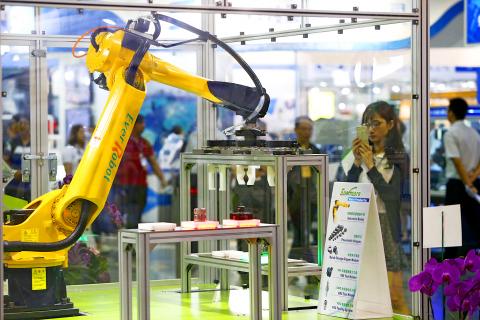The Industrial Technology Research Institute (ITRI, 工研院) yesterday said it is collaborating with local manufacturers to offer new-generation, affordable robots for electronics and logistics companies to automate their factories and warehouses.
Different from the chunky industrial robots that are usually deployed at large-scale factories, the institute said it is more interested in developing collaborative robots for smaller and more diverse factory and depot automation.
“Traditional industrial robots are suitable for large-scale production lines. They need a lot of space and cost a lot of money, which small and medium-sized enterprises cannot afford,” Patrick Yu (游鴻修), acting division director of ITRI’s mechanical and mechatronics systems research labs, told reporters on the sidelines of the Taiwan Automation Intelligence and Robot Show at the Taipei Nangang Exhibition Center, Hall 1.

Photo: CNA
“We believe that collaborative robots, which are designed to work in relative safety with people on the same factory floor, can have richer features and be applied to more industries.”
Such machines could be used to pick up and package goods in an e-commerce depot or in the food processing sector, Yu said.
The Hsinchu-based institute is developing a prototype collaborative robot, Yu said.
The institute has spun off a research unit to put the machines on the market, he said.
The institute in collaboration with Shihlin Electric & Engineering Corp (士林電機) has also developed servomotors for “smart” robotic arms, Yu said.
The institute is also working with Autotek Corp (和樁) to develop an all-in-one machine arm joint, he said.
The institute said its robots would be deployed in smaller factories at affordable prices without major overhauls of workspaces or warehouses.
Their operations would become like Amazon.com Inc’s “smart” warehouses, it said.
Also eyeing growing demand for factory automation, Rong Shin Automation Technology (榮興自動化科技) has partnered with the institute to roll out small, automated conveyor systems for use in the assembly lines and to offer assistance in grocery warehouses.
With a modular design that can be arranged according to where it is to be used, the conveyor systems can transport goods between shelves faster than people, the institute said.
What makes Rong Shin different is that the company also offers leasing services for its products, the institute said.
Noveltek Industrial Manufacturing Inc (恆智重機), which concentrates on goods transportation, also displayed its latest driverless forklifts at the show.

CHIP WAR: Tariffs on Taiwanese chips would prompt companies to move their factories, but not necessarily to the US, unleashing a ‘global cross-sector tariff war’ US President Donald Trump would “shoot himself in the foot” if he follows through on his recent pledge to impose higher tariffs on Taiwanese and other foreign semiconductors entering the US, analysts said. Trump’s plans to raise tariffs on chips manufactured in Taiwan to as high as 100 percent would backfire, macroeconomist Henry Wu (吳嘉隆) said. He would “shoot himself in the foot,” Wu said on Saturday, as such economic measures would lead Taiwanese chip suppliers to pass on additional costs to their US clients and consumers, and ultimately cause another wave of inflation. Trump has claimed that Taiwan took up to

A start-up in Mexico is trying to help get a handle on one coastal city’s plastic waste problem by converting it into gasoline, diesel and other fuels. With less than 10 percent of the world’s plastics being recycled, Petgas’ idea is that rather than letting discarded plastic become waste, it can become productive again as fuel. Petgas developed a machine in the port city of Boca del Rio that uses pyrolysis, a thermodynamic process that heats plastics in the absence of oxygen, breaking it down to produce gasoline, diesel, kerosene, paraffin and coke. Petgas chief technology officer Carlos Parraguirre Diaz said that in

Japan intends to closely monitor the impact on its currency of US President Donald Trump’s new tariffs and is worried about the international fallout from the trade imposts, Japanese Minister of Finance Katsunobu Kato said. “We need to carefully see how the exchange rate and other factors will be affected and what form US monetary policy will take in the future,” Kato said yesterday in an interview with Fuji Television. Japan is very concerned about how the tariffs might impact the global economy, he added. Kato spoke as nations and firms brace for potential repercussions after Trump unleashed the first salvo of

SUPPORT: The government said it would help firms deal with supply disruptions, after Trump signed orders imposing tariffs of 25 percent on imports from Canada and Mexico The government pledged to help companies with operations in Mexico, such as iPhone assembler Hon Hai Precision Industry Co (鴻海精密), also known as Foxconn Technology Group (富士康科技集團), shift production lines and investment if needed to deal with higher US tariffs. The Ministry of Economic Affairs yesterday announced measures to help local firms cope with the US tariff increases on Canada, Mexico, China and other potential areas. The ministry said that it would establish an investment and trade service center in the US to help Taiwanese firms assess the investment environment in different US states, plan supply chain relocation strategies and